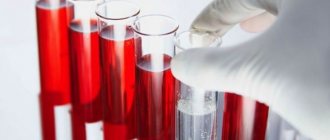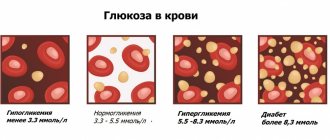HCG (human chorionic gonadotropin) is a hormone released during pregnancy. Using a laboratory blood test, the concentration of beta subunits is determined. Conception can be detected using this method as early as 6-8 days. The hCG test also differentiates a normal pregnancy from an ectopic one. The online hCG calculator will help you decipher the blood test. You will be able to track the dynamics of hormone growth indicators and be able to determine the duration of pregnancy.
APPOINTMENT WITH A GYNECOLOGIST - 1000 rubles. CONSULTATION WITH A GYNECOLOGIST ON THE RESULTS OF AN ULTRASOUND AND ANALYSIS - RUB 500!
CLICK TO SIGN UP
What is hCG - “beta”?
The content of the article
HCG is a hormone that is produced by the fetus itself, or rather by the fetal membrane of the embryo (chorion). The process begins immediately when the embryo is implanted into the uterus. At this moment, the fetus still looks like a small bubble of liquid, consisting of an embryoblast (from which the fetus will form in the future) and trophoblast (cells that form the chorion).
Under the influence of gonadotropin, the corpus luteum produces hormones that maintain the condition of the endometrium (the inner lining of the uterus) necessary for normal pregnancy. An increase in hCG concentration indicates that fertilization has taken place.
HCG contains:
- Alpha subunits. They are not determined because they have no diagnostic value during pregnancy.
- Beta subunits, which make it possible to determine the fact of conception and the period of fetal development.
That is why the term human chorionic gonadotropin in pregnancy tests refers to its beta component.
Biological properties
In terms of biological functions, hCG is similar to luteinizing and follicle-stimulating hormones. It binds to both types of gonadotropic receptors, but is significantly superior to gonadotropins in biological activity. Thanks to hCG, the corpus luteum functions for up to 12 weeks, instead of the usual two. After 12 weeks, the placenta forms, producing estrogen and progesterone. In addition, hCG stimulates the production of female sex hormones and weak male hormones in the ovarian follicles.
There is evidence that human chorionic gonadotropin activates the synthesis of steroids by the adrenal cortex. This can help the body adapt to pregnancy as stress, suppress the function of the immune system and prevent fetal rejection. The data are confirmed by the fact that corticotropic hormones produced in the pituitary gland do not have such properties.
Another function of human chorionic gonadotropin is to maintain placental function. The hormone improves the nutrition of the organ and increases the number of chorionic villi. An injection of the hormone in the middle of the cycle increases the production of estrogens and progesterones, promotes ovulation and the formation of the corpus luteum. In men, a synthetic hormone stimulates the production of sperm and androgens. An increase in hCG in the absence of pregnancy indicates a malignant disease.
How do hCG levels change during pregnancy?
For the first time, an increase in beta-hCG levels is detected starting from the sixth day after conception. At first, the concentration of the hormone doubles every two days. Further, the increase in hCG concentration slows down and when the level reaches 1200 mU/ml, doubling begins to occur every 72-96 hours. Upon reaching 6000 mU/ml, growth occurs every 96 hours.
The concentration indicator is not just boring numbers: it is what helps determine the gestational age.
After 11 weeks, the hormone in the body becomes less, but its level is still increased. At 34 weeks, a second increase in hCG occurs. This surge, according to scientists, triggers labor. After childbirth, the level of beta-hCG in the blood gradually decreases.
HCG level and growth
The hormone allows you to track the normal or problematic course of pregnancy. The embryonic period (from conception) is always less than the obstetric period (counted from the last menstruation) by 2 weeks. The Private Practice Clinic offers pregnancy tracking from the 1st week.
The analysis can be done after ten days from fertilization. Every 2 days the hormone level doubles. Since the membrane of each embryo secretes a certain amount of gonadotropin, this helps to calculate how many fetuses are present.
The increase in hCG over the weeks of pregnancy allows you to track how the fetus develops and detect pathologies in time. Any deviations from the accepted standard values indicate disruptions in embryonic development. The highest levels of gonadotropin are from the 7th to the 10th week. After this, the growth of chorionic hormone decreases somewhat and freezes at these values until the 2nd half of the term. The age of the embryo can be determined using the tables presented below.
Online hCG calculator
The calculator will help you when deciphering blood tests for hCG. You will be able to monitor the growth dynamics of Beta-hCG and determine the duration of pregnancy.
The results indicated in the tables and the hCG calculator itself are approximate. To determine this hormone, various methods can be used and indicators may vary. Therefore, the analysis is deciphered where it was done. The units of measurement for the concentration of beta-hCG are also different. The concentration is indicated in honey/ml, mIU/ml, U/l and IU/l as well as U/l mIU/ml, IU/l. All indicators are the same and do not need to be recalculated. U stands for units, IU stands for international units, mIU/ml and U/l are the English display of units.
Norms and “jumps” of indicators
When the value reaches 2000 mIU/ml, an ultrasound is performed at the Private Practice clinic, in which the yolk sac is already visible. It is not always possible to accurately calculate the date of conception, therefore hCG norms are different for all women, and the concentration of gonadotropin is compared with the “minimum-maximum”. Indicators for multiple births increase significantly (this depends on the number of embryos).
To monitor the correct course of pregnancy, gynecologists at our clinic offer blood donations every couple of days or once a week. After the initial analysis, repeat tests should also be carried out at our place, since other medical institutions may use other methods to determine values.
Beta-hCG levels at different stages of pregnancy
| Days after last menstruation | Gestation period (days/weeks) | HCG in honey/ml |
| 26 | 12 | 0-50 |
| 27 | 13 | 25-100 |
| 28 | 14 (2 weeks) | 50-100 |
| 29 | 15 | 100-200 |
| 30 | 16 | 200-400 |
| 31 | 17 | 400-1000 |
| 32 | 18 | 1050-3000 |
| 33 | 19 | 1450-4000 |
| 34 | 20 | 1940-5000 |
| 35 | 21 (3 weeks) | 2600-6500 |
| 36 | 22 | 3400-8500 |
| 37 | 23 | 4400-10800 |
| 38 | 24 | 5700-13700 |
| 39 | 25 | 7200-17000 |
| 40 | 26 | 9000-21000 |
| 41 | 27 | 10100-23300 |
| 42 | 28 (4 weeks) | 11200-2550 |
| 43 | 29 | 13700-30900 |
| 44 | 30 | 16600-36500 |
| 45 | 31 | 19900-43000 |
| 46 | 32 | 25500-50200 |
| 47 | 33 | 27450-57650 |
| 48 | 34 | 31700-65400 |
| 49 | 35 (5 weeks) | 36100-73200 |
| 50 | 36 | 40700-81150 |
| 51 | 37 | 45300-88800 |
| 52 | 38 | 49800-96000 |
| 53 | 39 | 54100-102500 |
| 54 | 40 | 58200-108200 |
| 55 | 41 | 61640-112800 |
| 56 | 42 (6 weeks) | 64000-116310 |
HCG by days from conception
| Post-ovulation days | Hormone level | |
| High | Short | |
| Exactly one week | 10 | 2 |
| 8 | 18 | 3 |
| 9 | 21 | 5 |
| 10 | 26 | 8 |
| 11 | 45 | 11 |
| 12 | 65 | 17 |
| 13 | 105 | 22 |
| Two weeks | 170 | 29 |
| 15 | 270 | 39 |
| 16 | 400 | 68 |
| 17 | 580 | 110 |
| 18 | 840 | 220 |
| 19 | 1300 | 360 |
| 20 | 2000 | 510 |
| Three weeks | 3000 | 740 |
| 22 | 4800 | 1040 |
| 23 | 6100 | 1300 |
| 24 | 7700 | 1730 |
| 25 | 9700 | 2300 |
| 26 | 15500 | 4100 |
| 27 | 19400 | 5300 |
| Four weeks | 27200 | 7000 |
| 29 | 32000 | 8600 |
| 30 | 40000 | 10300 |
| 31 | 60000 | 11300 |
| 32 | 62000 | 12600 |
| 33 | 67000 | 13500 |
| 34 | 70000 | 15200 |
| Five weeks | 73000 | 16000 |
| 36 | 77000 | 18000 |
| 37 | 82000 | 20300 |
| 38 | 86000 | 21000 |
| 39 | 92000 | 22000 |
| 40 | 107000 | 24000 |
| 41 | 116000 | 25400 |
| Six weeks | 127000 | 27000 |
Concentration of chorionic gonadotropin at later stages
| Duration in weeks | HCG concentration honey/ml |
| 7 | 65000 — 155000 |
| 8 | 67500 — 190000 |
| 9-10 | 70000 — 211000 |
| 11-12 | 13500 — 63000 |
| 13-14 | 1200 — 71000 |
| 15-25 | 8000 — 60000 |
| 26-37 | 5000 — 55000 |
HCG as part of pregnancy screening
The level of the hormone is determined in venous blood serum. No complex preparation is required for diagnosis. Biomaterial is collected in the morning.
General preparation rules:
- diagnostics are carried out on an empty stomach;
- the woman must inform the gynecologist about all medications used, because the drugs can affect the results of laboratory diagnostics;
- on the eve of donating blood, it is necessary to limit physical activity and eliminate the effect of unfavorable factors;
- other instrumental studies are carried out after diagnosis and determination of the level of pregnancy hormone in the blood.
After collection, the blood is placed in a centrifuge and then separated into fibrinogen and serum. Specialists then determine beta units using immunometric methods. The woman is informed of the result within 24 hours. The hCG level increases in proportion to the number of fetuses.
Why is a beta-hCG blood test more sensitive than a drugstore test?
Pregnancy tests are not accurate for the following reasons:
- The concentration of hCG in urine is almost two times lower than in the blood, so even the most sensitive test will give a false negative result in the early stages.
- Human chorionic gonadotropin tests sold in pharmacies are capricious and may not work correctly. Reasons: inaccurate analysis, expired reagent, improper storage of the test.
- If you drink a lot of water in the evening or take a diuretic, the test will not detect pregnancy. Tests also give false negative results for kidney diseases.
Every year there are thousands of mothers in the world who for a long time did not imagine their “interesting situation”, trusting pharmacy strips.
Deviations
Sometimes pregnancy may not develop, but a hydatidiform mole occurs - the growth of chorionic villi in the form of bubbles with liquid contents. At the same time, human chorionic gonadotropin also increases, which can be mistaken for the presence of pregnancy. In this case, the patient must undergo ultrasonography and other studies to make an adequate diagnosis and eliminate the drift, since it can transform into a malignant tumor if treatment is not carried out in time.
HCG variability can mean different conditions when indicated:
| Understated | Overpriced |
| Ectopic pregnancy | Incorrect determination of gestational age |
| Incorrect deadline | Multiple pregnancy - twins, triplets, especially fraternal ones. Heterozygous twins have their own placenta, each of which intensely secretes the hormone |
| The fetus is delayed in development | Chromosomal mutations (high probability of Edwards Syndrome). If the hormone increases in the second trimester, then Down syndrome is possible |
| Risk of miscarriage | Diabetes mellitus in an expectant mother |
| Placental insufficiency | Preeclampsia |
| Non-developing pregnancy | Taking synthetic progesterone |
| Post-maturity | Early toxicosis |
| Intrauterine death of a child | |
| After in vitro fertilization, conception did not occur or the embryo did not implant |
How is a human chorionic gonadotropin test taken?
For the analysis, blood from a vein is needed in the morning on an empty stomach. Measurement of beta-hCG concentration is performed no earlier than 3-5 days after a missed period. When taking hormones, you need to inform your doctor about this - they can affect the concentration of hCG.
To diagnose congenital pathologies (perinatal screening), an hCG test is performed at 14-18 weeks. Determination of hCG in men and non-pregnant women (analysis for tumor markers) can be carried out on any day.
Increased hormone concentrations
Elevated hCG in pregnant women is sometimes detected not only in cases of multiple pregnancy. These values are:
- with toxicosis;
- after consuming artificial gestagens;
- for Down syndrome, heart pathologies;
- if the deadline is set incorrectly;
- with gestosis;
- if a woman has diabetes;
- with developmental defects.
If chorionic hormone is detected in males or women who are not expecting a child, this indicates the formation (or growth) of malignant tumors in the body.
The concentration of beta-hCG is different from the norm, what does this mean?
The online hCG calculator only works to determine pregnancy. If pregnancy is not confirmed and there are no other signs of pregnancy, you need to make an appointment with an oncologist. An increase in the hCG hormone can occur in both non-pregnant women and men. This indicates malignant tumors of the uterus (chorionepithelioma, chorionic carcinoma) or testicles. An increase in the hormone is also observed in cancer of the bladder, kidneys, intestines, and lungs.
| Excess hCG | Decreased hCG |
| Multiple pregnancy. In case of twins or triplets, the level is proportional to the number of embryos | Risk of miscarriage |
| Toxicosis | Death of an embryo or fetus |
| Down syndrome (more research needed) | Frozen pregnancy |
| The term is incorrectly defined | Placental insufficiency |
| Post-term pregnancy | |
| Ectopic pregnancy | |
| Hydatidiform mole | |
| Pregnancy after stimulation or IVF |
If a high level of hCG persists after an abortion, this indicates an incomplete abortion - incomplete removal of the fertilized egg or an ongoing pregnancy. Gonadotropin levels also increase when taking hormonal medications.
Decreased hormone levels
HCG levels can decrease for many reasons. More often the cause is a disruption of menstrual cycles. Then it is difficult to set a deadline. Other reasons for decreased gonadotropin concentrations include:
- embryo development outside the uterus;
- true post-maturity;
- frozen pregnancy;
- chronic placental insufficiency;
- in the 2nd–3rd trimester – fetal death.
If the concentration of the hormone is reduced by more than 50 percent of normal, this threatens miscarriage. If the analysis is premature, the egg is fixed outside the uterus, or the fetus is absent, hCG may not be detected at all.
To obtain 100% results, it is recommended to do a little preparation before donating blood in the clinic. The day before the procedure, physical activity, worries and stress are excluded. Food and water intake is stopped several hours before blood donation. If a woman is taking hormonal medications, she should notify the doctor in advance. Drugs may distort the results.
The role of the hormone in diagnosing pregnancy
Analysis of the amount of total hCG occupies a special place in confirming pregnancy in the early stages. This is due to the fact that the hormone begins to be actively released a few days after the fertilized egg attaches to the wall of the uterus. During normal development of the embryo, the level of the substance doubles every 1.5-2 days. By the tenth week, the amount of hCG in a woman’s tests can reach maximum values - up to 225,000 mU/ml.
Simultaneously with blood tests for total hCG, the pregnant woman is also prescribed other examinations. So the patient must visit the ultrasound scanning room at least three times. Several studies may be required over a period of nine months. Comprehensive 1st and 2nd trimester screenings also include an hCG test.
Reasons for deviation of hCG from the norm
Very often, during IVF, several blastocysts are implanted into the body of the expectant mother at once. In this way, it is possible to increase the chances of implantation of at least one embryo into the uterine wall. In some cases, implantation of all blastocysts implanted in the uterus is observed, which leads to multiple pregnancies. In such a situation, during a blood test, the hormone content in the plasma is high.
Low hCG
If hCG slowly increases after IVF, this may indicate the following conditions:
- fetal freezing;
- threat of spontaneous abortion;
- ectopic pregnancy.
Tests are taken at least 2-3 times to determine the dynamics of increase or decrease in plasma hormone levels. If it is in a borderline state, the expectant mother is prescribed hormone injections. Maintaining hCG at normal levels reduces the risk of miscarriage.
A sharp decrease in hCG
After IVF, the likelihood of fetal death is high, so the level of gonadotropin in the blood is monitored until the 2nd trimester. A critical decrease in hCG levels is a good reason to seek help from a fertility specialist.
Important! To eliminate the possibility of high error in the results of the hCG test, it is recommended that tests be taken in the same laboratory.
Hormonal instability increases the risk of miscarriage or pathological intrauterine development of the fetus. If such a problem is detected, the woman is sent to the hospital for conservation. Artificially maintaining hormonal balance helps prevent miscarriage and normalize the course of pregnancy.
HCG after IVF pregnancy
Immediately after gestation, regardless of the method of fertilization, human chorionic gonadotropin begins to be produced in the body of the expectant mother. It is secreted by the membrane of the embryo, which is called the chorion. The hCG content after IVF is used to judge the success of artificial insemination and the course of gestation.
HCG content after IVF
2 weeks after the blastocyst is implanted into the uterine cavity, a test for the content of human chorionic gonadotropin is performed. After in vitro fertilization, its concentration is constantly monitored.
To independently determine the outcome of IVF, you can use a “home” test. A positive result indicates a successful conception, but does not provide information about the course of gestation itself. To track the dynamics of fetal development, an hCG test is done after IVF on a daily basis.
A systematic blood test is carried out for:
- confirmation of successful conception and onset of gestation;
- timely identification of risks for intrauterine development of the fetus;
- diagnosis of genetic pathologies in the development of a child in the 2nd trimester of gestation;
- determining possible risks for a woman (a low level of gonadotropin may signal pathologies of the placenta or ectopic pregnancy).
It should be understood that normal levels of the hormone in plasma do not always confirm the smooth course of gestation. In isolated cases, even with a high concentration in the body, it turns out that the embryo is absent from the fertilized egg. An ultrasound examination is performed to confirm the fact of conception. With its help, the location of the fetus and its heartbeat are determined.
HCG table
No pregnancy 0 – 5 mIU Pregnancy in doubt 5 – 25 mIU/ml Third – fourth week 25 – 156 mIU/ml Fourth – fifth week 101 – 4870 mIU/ml Fifth – sixth week 1110 – 31500 mIU/ml Sixth seventh week 2560 – 82300 mIU/ml Seventh – eighth week 23100 – 151000 mIU/ml Eighth – ninth 27300 – 233000 mIU/ml Ninth – thirteenth week 20900 – 291000 mIU/ml Thirteenth – eighteenth 6140 – 103000 mIU/ml In seventeenth – twenty-third 4720 – 80100 mIU /ml Twenty-third – forty-first 2700 – 78100 mIU/ml
The absence of human chorionic gonadotropin can be observed during ectopic pregnancy. Therefore, the diagnosis of this pathology is difficult.
HCG is a specific pregnancy hormone
Thanks to human chorionic gonadotropin (hCG), the body of a pregnant woman increases the production of hormones that are necessary to maintain pregnancy - progesterone, estrogens. The role of this hormone in the first trimester is very significant.
Free human chorionic gonadotropin (the beta subunit of the hCG hormone, one of the components of the hormone) reflects the condition of the fetus, and its level is important when screening pregnant women to detect chromosomal abnormalities in the child. Exceeding the level of free human chorionic gonadotropin may indicate Down syndrome. The level of the beta subunit compared to total human chorionic gonadotropin (HCG) is very low, and therefore cannot be used to diagnose pregnancy.
The role of human chorionic gonadotropin (CG) in the body
Human chorionic gonadotropin is a specific pregnancy hormone. It is a glycoprotein consisting of two subunits: alpha and free human chorionic gonadotropin - beta, which are also detected in the blood, but in smaller quantities.
Human chorionic gonadotropin is produced by the cells of the membrane (chorion) of the embryo. Therefore, a blood test for human chorionic gonadotropin determines the presence of chorionic tissue in the body and the occurrence of pregnancy. The level of human chorionic gonadotropin (hCG) in the blood allows you to diagnose pregnancy in the early stages. Human chorionic gonadotropin controls the production of the main pregnancy hormones. Before the placenta is formed (up to 9-10 weeks), human chorionic gonadotropin (hCG) maintains normal progesterone production. Human chorionic gonadotropin influences the preservation of the corpus luteum during pregnancy. Chorionic gonadotropin is also of great importance in the development and maintenance of the placenta itself - it improves its trophism.
It is also believed that human chorionic gonadotropin stimulates the synthesis of testosterone by the fetal gonads, and also affects the adrenal cortex of the embryo.
In addition to establishing the fact of pregnancy, the level of human chorionic gonadotropin allows one to judge the course of pregnancy, the presence of complications and multiple pregnancies.
When is it possible to determine human chorionic gonadotropin?
Determination of human chorionic gonadotropin in blood serum is a reliable method for determining pregnancy. This analysis can be carried out from the 6th day from the moment of fertilization. The concentration of human chorionic gonadotropin (HCG) in the urine reaches the required level for diagnosing pregnancy 1 to 2 days later than in the blood serum. A rapid pregnancy test is based on the determination of human chorionic gonadotropin in the urine. This test is often used by women at home. When performing a test at home, it is necessary to take into account that the diagnostic level of human chorionic gonadotropin (hCG) in the urine appears on the 8-9th day from possible conception.
However, you should know that quantitative determination of this hormone in the blood is more accurate. Blood for human chorionic gonadotropin can be donated as early as 1–2 days of delayed menstruation, however, given individual differences in the rate of synthesis of human chorionic gonadotropin in women, it is better to conduct the study no earlier than 4–5 days of delayed menstruation.
In the absence of pathology, the level of human chorionic gonadotropin during pregnancy increases every 2 days and increases several thousand times. The maximum concentration of human chorionic gonadotropin (hCG) is reached by 10-11 weeks of pregnancy, after this period the level of the hormone gradually decreases and remains unchanged until the end of pregnancy.
When assessing test results, it should be taken into account that synthetic gestagens, which are used to treat miscarriage, increase the level of beta-chorionic gonadotropin. Its content in the blood also increases during multiple pregnancies (proportional to the number of fetuses).
In what cases is human chorionic gonadotropin determined in the blood?
Human chorionic gonadotropin is determined for:
- diagnostics of early pregnancy;
- detection of amenorrhea;
- assessing the completeness of induced abortion. When determining the completeness of termination of pregnancy, a hCG test is performed 1–2 days after surgery;
- exclusion of ectopic pregnancy, threatened miscarriage and non-developing pregnancy. A decrease in the level of human chorionic gonadotropin during pregnancy or a slowdown in its growth indicates a spontaneous miscarriage or ectopic pregnancy. A decrease in the level of human chorionic gonadotropin by more than 50% is a threat of spontaneous abortion;
- prenatal diagnosis of child developmental defects. This diagnosis is based on the ratio of free beta human chorionic gonadotropin and total human chorionic gonadotropin (hCG).
Thus, in the first trimester the ratio of beta fraction and human chorionic gonadotropin is 1-4%.
In the II and III trimester, this ratio is less than 1%. In the presence of chromosomal diseases in the fetus, the amount of free beta-chorionic gonadotropin increases faster than the level of total human chorionic gonadotropin. In this regard, for prenatal screening of chromosomal diseases of the fetus, the determination of beta-chorionic gonadotropin should be carried out at 9-11 weeks. Human chorionic gonadotropin is also determined in men for the diagnosis of testicular tumors (seminoma, testicular teratoma). An increase in the level of human chorionic gonadotropin in non-pregnant women can be a sign of serious diseases: tumors of the gastrointestinal tract, lungs, kidneys, uterus (chorionepithelioma). It has been proven that various malignant tumors can produce human chorionic gonadotropin, the so-called ectopic production of hCG. An accelerated rate of increase in the level of human chorionic gonadotropin is a sign of hydatidiform mole. Below are the options for the norm of human chorionic gonadotropin.
Chorionic gonadotropin is the norm in men and non-pregnant women - up to 1.0 mIU/ml. There are no strict standards for the content of this hormone in the blood of pregnant women. At the same stage of pregnancy, hormone levels can vary greatly among different women. Therefore, the dynamics of changes in hormone concentration are important to assess the process of pregnancy development.
The dynamics of this hormone during pregnancy are shown below. Human chorionic gonadotropin is the norm in pregnant women:
- 3 weeks - 5.8–71.2;
- 10–11 weeks - 46509–186977;
- 18 weeks - 19817.
The level of human chorionic gonadotropin may vary slightly depending on the laboratory, however, normal values are indicated in the test results. Use of human chorionic gonadotropin
The drug human chorionic gonadotropin is a hormone that has the properties of luteinizing hormone of the anterior pituitary gland. Other names: Pregnil, Profasi, Horagon, Ecostimulin. Human chorionic gonadotropin is prescribed as intramuscular injections for therapeutic purposes to women and men. Human chorionic gonadotropin, the dosage of which depends on the disease and the achievement of the desired effect, is prescribed only by a doctor.
Chorionic gonadotropin injections are prescribed to women for infertility associated with lack of ovulation and menstrual irregularities. Women with anovulatory menstrual cycles, starting from the 10th–12th day of the cycle, are prescribed human chorionic gonadotropin in a dosage of 3000 IU 2–3 times with an interval between injections of 2–3 days. In this case, treatment achieves stimulation of follicle maturation with human chorionic gonadotropin and endometrial proliferation.
Administration of human chorionic gonadotropin to a woman mid-cycle causes an increase in the production of estrogen and progesterone in the ovaries. Thus, the drug human chorionic gonadotropin stimulates ovulation and luteinization of the ruptured follicle. When using assisted reproduction methods, the drug is used to accelerate ovulation after stimulating follicular growth. To stimulate superovulation, before preparing the follicle for puncture, human chorionic gonadotropin is prescribed in a dosage of up to 10,000 IU in the form of 1 injection.
For the purpose of stimulation, human chorionic gonadotropin is prescribed to women with luteal phase deficiency. The drug supports the function of the corpus luteum. Chorionic gonadotropin injections are prescribed for late puberty in girls. Also, human chorionic gonadotropin injections are used for recurrent miscarriage and threatened abortion in pregnant women. For recurrent miscarriage, treatment begins no later than 8 weeks of pregnancy and up to 14 weeks inclusive.
In boys, chorionic gonadotropin is used for stimulation in cases of delayed puberty, testicular hypoplasia, pituitary dwarfism with the presence of sexual infantilism, hypogonadism with signs of eunuchoidism. In men, exogenous human chorionic gonadotropin stimulates the production of sex hormones and spermatogenesis in oligo- and asthenospermia. The use of the hormone human chorionic gonadotropin for men gives positive reviews - this drug helps improve sperm motility.
HCG, Ovulation stimulation, Infertility treatment, pregnancy






